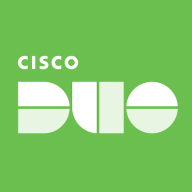

Cisco Duo and Fortinet FortiToken compete in the security solutions category. Cisco Duo seems to have the upper hand in user satisfaction for its comprehensive features and superior support.
Features: Cisco Duo is recognized for its seamless integration, flexibility, and advanced authentication capabilities. Fortinet FortiToken excels with high-level encryption, token-based protection, and strong security. Cisco Duo scores higher on ease of use and adaptability, while FortiToken focuses on robust security.
Room for Improvement: Cisco Duo could benefit from additional customization options, enhanced reporting tools, and greater adaptability. Fortinet FortiToken needs improvements in token synchronization reliability, mobile compatibility, and overall usability enhancements.
Ease of Deployment and Customer Service: Cisco Duo is praised for its straightforward deployment process and exceptional customer support. Fortinet FortiToken users report a steeper learning curve but value the detailed setup guides. Cisco Duo offers prompt responses and helpful assistance, whereas FortiToken's support is efficient but less accessible.
Pricing and ROI: Cisco Duo has a higher initial setup cost but delivers ROI through enhanced security and productivity gains. Fortinet FortiToken is affordable, with straightforward pricing, offering good value for basic security needs. Cisco Duo provides long-term ROI with comprehensive features, while FortiToken attracts users with its economical pricing.
Not having MFA means you cannot put a price tag on that because you will be hit with ransomware immediately.
I think Cisco Duo offers a good return on investment for startups, newer organizations, or those utilizing cloud-based applications.
I have not seen ROI with Cisco Duo; probably the opposite, because it impedes productivity time to be able to get into the system.
They got back to us quickly, were nice, and gave us what we needed.
I would rate their support 10 out of 10.
I would rate support for Cisco Duo a 10, as I have never had a negative experience.
Their resolution time is timely, and they provide solutions efficiently.
I am satisfied with their service.
In my last contracting position, it was a large one for a major worldwide airline that had hundreds of thousands of devices that could use Cisco Duo, and it scaled very well.
You would not need many more engineers to manage Cisco Duo even if we scale up to 500 employees because it is so simple to manage.
Cisco Duo is scalable for organizational growth.
There is a need to scale more effectively to accommodate a larger number of users and bulk users.
Regarding Fortinet FortiToken's scalability, we can purchase licenses according to our needs.
I would rate scalability for Fortinet FortiToken as nine and a half or ten.
We have not had any Cisco Duo outages across all the companies I have worked for that utilize Cisco Duo.
The stability has been excellent.
I did not notice any downtime or crashes with Cisco Duo.
I would rate stability for Fortinet FortiToken as the best solution.
FortiToken is stable, but there are some restrictions when it comes to supporting two-factor authentication in multi-factor environments.
If you don't have internet access, you can't access your computer, only local access is available.
It lacks some dynamic identity management features compared to other products such as SailPoint.
Cisco should allow easier integration with third-party equipment because Cisco's own equipment is expensive.
Any Fortinet FortiToken cannot be removed; if a box expires or loses support, it cannot be removed, and customers must purchase it from scratch.
This would allow for broader distribution among a larger number of system admins and software engineers, which is currently not feasible with the existing hardware-only approach.
If I can receive it on email, it would be more flexible.
The pricing is acceptable to them.
Their website lists $3 per month per user for the Essential license.
One of my customers recently received a billing statement charging 3,600 US dollars for 100 users for one year.
Discounts are often provided to close deals, making it a cost-effective solution.
The pricing for FortiToken is not low; I regard it as medium-priced.
From a management perspective, I appreciate that we can enroll or control devices on the back end for people who get a new phone and forget to handle Cisco Duo properly and need to add a new device.
Our company benefits from all those features of Cisco Duo with confidence, and we feel very secure with it in terms of authentication of our logins.
The benefit of having a complete passwordless environment in our organization is that it's gotten people away from using the sticky note under their keyboard - which is a huge problem.
The main use case of FortiToken is that it is a hardware-based solution, providing secure two-factor authentication for administrators.
Fortinet FortiToken provides very important security benefits because it is used to manage FortiGate from outside, exclusively with Fortinet FortiToken.
It is very user-friendly and easily integrates with various firewalls, making it convenient to use within diverse environments.
| Product | Market Share (%) |
|---|---|
| Cisco Duo | 4.8% |
| Fortinet FortiToken | 3.3% |
| Other | 91.9% |


| Company Size | Count |
|---|---|
| Small Business | 41 |
| Midsize Enterprise | 23 |
| Large Enterprise | 53 |
| Company Size | Count |
|---|---|
| Small Business | 18 |
| Midsize Enterprise | 5 |
| Large Enterprise | 9 |
Cisco Duo is a cloud-based identity security platform safeguarding critical resources for any user and device worldwide. Known for its ease of use, Duo offers seamless protection across multi-cloud, hybrid, and on-premises environments.
Cisco Duo is designed to secure access with identity-first protection and provides extensive visibility throughout an organization's identity ecosystem. Offering multi-factor authentication, Duo facilitates easy integration and management, allowing teams to protect data effectively on VPNs, applications, and networks. Its single-pane management improves security processes while enhancing trust, making it suitable for diverse IT infrastructures.
What are the key features of Cisco Duo?
Which benefits and ROI should users consider?
In industries like education and finance, Cisco Duo is widely employed to secure multi-factor authentication across platforms such as email, databases, and servers. Its integration capabilities with Microsoft 365, Active Directory, and VPNs like AnyConnect are instrumental in verifying user identities using mobile apps or OTPs, catering effectively to both remote and on-premise environments.
As we've seen, passwords alone don't keep unwanted guests out of your network. Password-only authentication has led to security breaches, malware infections, and policy violations. With two-factor authentication, a password is used along with a security token and authentication server to provide far better security. Authorized employees can remotely access company resources safely using a variety of devices, ranging from lpatops to mobile phones.
We monitor all Authentication Systems reviews to prevent fraudulent reviews and keep review quality high. We do not post reviews by company employees or direct competitors. We validate each review for authenticity via cross-reference with LinkedIn, and personal follow-up with the reviewer when necessary.